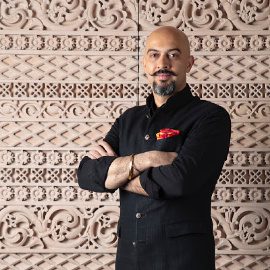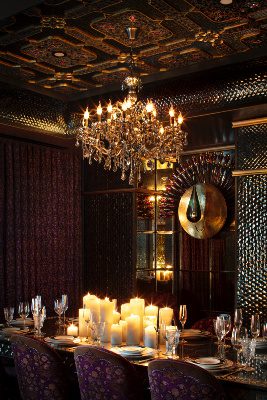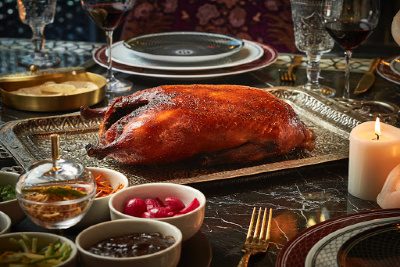
Nothing has been left to chance at Punjab Grill. Nothing has been done by accident.
The interior has been meticulously designed and crafted by skilled workers in India’s northern state of Punjab. Restaurant staff wear uniforms made in one of India’s top design houses using custom-designed textiles. And each dish has a story behind it.
“Our cuisine and our menu is very traditional using traditional recipes and time-honored techniques, but all with our own signature touch,” CEO Karan Singh said. “Our aim in opening this restaurant was to kind of redefine the standard of fine dining with respect to Indian cuisine.”
East Meets West
Punjab Grill opened in March at 427 11th St., N.W., and seats up to 140 patrons. Much work went into its planning. The entire interior of the restaurant was custom built in India with Amit Krishn Gulati and Grupo7 Architecture + Interiors, shipped over in modules and assembled on site. The exterior was built out and interior fittings measured down to the millimeter to create a full immersion experience. Teams from India visited the site twice, and teams from the U.S. also traveled to India.
Among the interior features of Punjab Grill is a 13,000-pound, hand-carved stone wall built in India and shipped to the U.S. for assembly. A similar process was put in place for the ornate, hand-carved wood screens. Tables, chairs and barstools were likewise made in India and shipped over. The craftsmanship leveraged ancient techniques and styles such as those used in India’s iconic forts, palaces and places of worship, Singh said.
“Most of those have been done by craftsmen whose ancestors built the original buildings,” he added. “Visually, the space is quite spectacular.”

The most opulent space in Punjab Grill is a private dining room for 10 dubbed the Sheesh Mahal, or “palace of mirrors.” Featuring walls of 150,000 hand-laid convex mirrors, the room comes with a dedicated concierge and a promise to make anything happen.
Food with Flair
The food is Punjabi food, inspired by or found in the northwest frontier state that separates India from Pakistan, Afghanistan and the Middle East. This “gateway to India” has long been traversed by visitors, travelers and even invaders entering India by land, and as such, has become a meeting ground of cultures, people and food.
“It’s got a tremendous depth and breadth of culinary diversity,” Singh said. “There are influences that come in from the Middle East, from Iran, from Afghanistan. There are even European influences that come in through Punjab, and then of course Punjab itself is a very rich and fertile state. It’s got tremendous agricultural history and tradition, great dairy farming. The best produce in India comes from Punjab. So Punjabi food has always been kind of the gold standard as far as Indian cuisine is concerned.”
Punjab Grill’s food philosophy is rooted in the history of undivided Punjab — joining both the Pakistan side as well as the portion in modern India. On both sides of the border, one can find hospitality, love of life, tremendous love and respect for guests, and “beautiful and delicious culinary traditions,” Singh said. And those ideals are what customers can expect at Punjab Grille.
“It’s using traditional recipes and ancient techniques, but all with our personal signature touch,” he said.
Executive Chef Jassi Bindra has cooked at some of India’s finest hotels and restaurants and is the leader behind a team of individuals who created the menu.
The menu is broadly divided into three sections, beginning with the “Small Plates,” moving to “The Lion’s Share” and culminating in the “Signature and Classics.” Small Plates feature creative dishes in which an Indian dish is given a global flair or vice versa.
Burrata “Badal Jaam” is an example of an international ingredient given the “Punjabi treatment.” Featuring Italian cheese, heirloom tomatoes and Punjabi spiced eggplant, the dish is a nod to the Punjabi dairy industry and its relationship to Italy.
“The Italian cheese industry is now almost entirely run by Sikh dairy farmers from Punjab,” Singh explained. “Ten or 12 years ago, the Italian cheese industry was dying. The dairy farmers weren’t making enough money. They were getting out of the business, and they didn’t have anybody to produce the cheese. Punjab has a very rich tradition of dairy farming, and just like the U.S. opened up its visas for software engineers, Italy opened up visas for the Punjabi dairy farmers … Almost the entire cheese industry in Italy is now run by Punjabis.”
Stories like this are why Punjab Grill is more than just fusion cuisine. Its pairings and creations are entirely intentional.
The Lion’s Share portion of the menu features dishes that come out of the griddle and tandoor and are typically not prepared in a curry or sauce. The 24-Carat Raan is a slow-cooked and braised sikandari leg of lamb served with a 24-karat gold leaf on it. “Sikandari” is a nod to the historic conquests and alliances made by Alexander the Great, who was called “Sikandar” in the East.
The Signatures and Classics portion of the menu features well-loved Punjabi dishes to which the chef has given his signature touch. Those include Kathal Kofta, featuring a vegan “goat,” made with jackfruit.
“It has the texture and look and feel and taste of meat, but it’s a completely vegan dish,” Singh said. “This is a dish that always surprises our diners. They look at it and they can’t believe it’s not meat, which is kind of fun given all the hype right now around Impossible and Beyond.”
There is also the Maharaja Menu, meaning for the king of kings or emperor. Designed for a grander experience, it features premium dishes and dishes for sharing with large groups.
“We believe we are the only Indian restaurant in the world that does a caviar service,” he said of the Maharaja Menu. “We get beautiful Petrossian caviar served to you with house-made white butter and on blinis.”

There is also a whole duck, called the Patiala Duck, based on the idea of Peking duck. It takes five days to prepare and is carved tableside.
“It’s done just like a traditional Peking duck service (with) completely Punjabi flavors and ingredients,” Singh said.
The guiding service philosophy for Punjab Grill is simple: the guest is god.
“That’s based on the Indian tradition that when a guest has come to your house, god has come to your house,” Singh said. “That’s what our staff has been taught and trained, and that embodies our philosophy toward hospitality. The guest is god, and there’s no further discussion of it.”
Aviator Turned Restauranteur
Singh’s previous career focus was in aviation. A trained airline captain, Singh flew commercial flights for a time before starting his own private aviation business flying corporate jets, helicopters, sales and charters. He continues to run that company.
“My entire life, I have been a foodie,” he said. “The whole family loves food. We travel the world eating at nice restaurants. We choose destinations based on the kind of food we’re going to get there.”
Singh attended the University of Pennsylvania in Philadelphia as well as Embry in Florida.

In 2012, he moved from India to the U.S. for personal reasons, and while working to explore his career options here, he decided to open a small restaurant on the side. That first small restaurant is American Tandoor, a casual fine dining experience in Tysons Corner open since 2015.
Singh had been coming to the U.S. with his family from early childhood and had long noticed the lack of Indian food options, let alone Indian cuisine in a fine dining setting paying homage to traditional decor in a tasteful and elegant way.
“That’s kind of where the idea (for Punjab Grill) came from,” he said. “I spoke to my designers and I said I wanted to have a beautiful Indian look and feel but relevant to D.C. in this day and age, and we started talking about how we would bring certain pieces and certain elements from India. As that discussion progressed, we realized that in order to truly achieve something special, we would have to pretty much build the entire interior in India.”
So they did.
His two restaurants have been formed in partnership with India-based Lite Bite Foods, which is owned by a long-time friend. There are plans in the works to build other restaurants in major U.S. cities, including some Indian eateries.
“Our ambition is to be a national player in the food and restaurant space,” Singh said.

